Three wheels, will travel!
The Trike Races
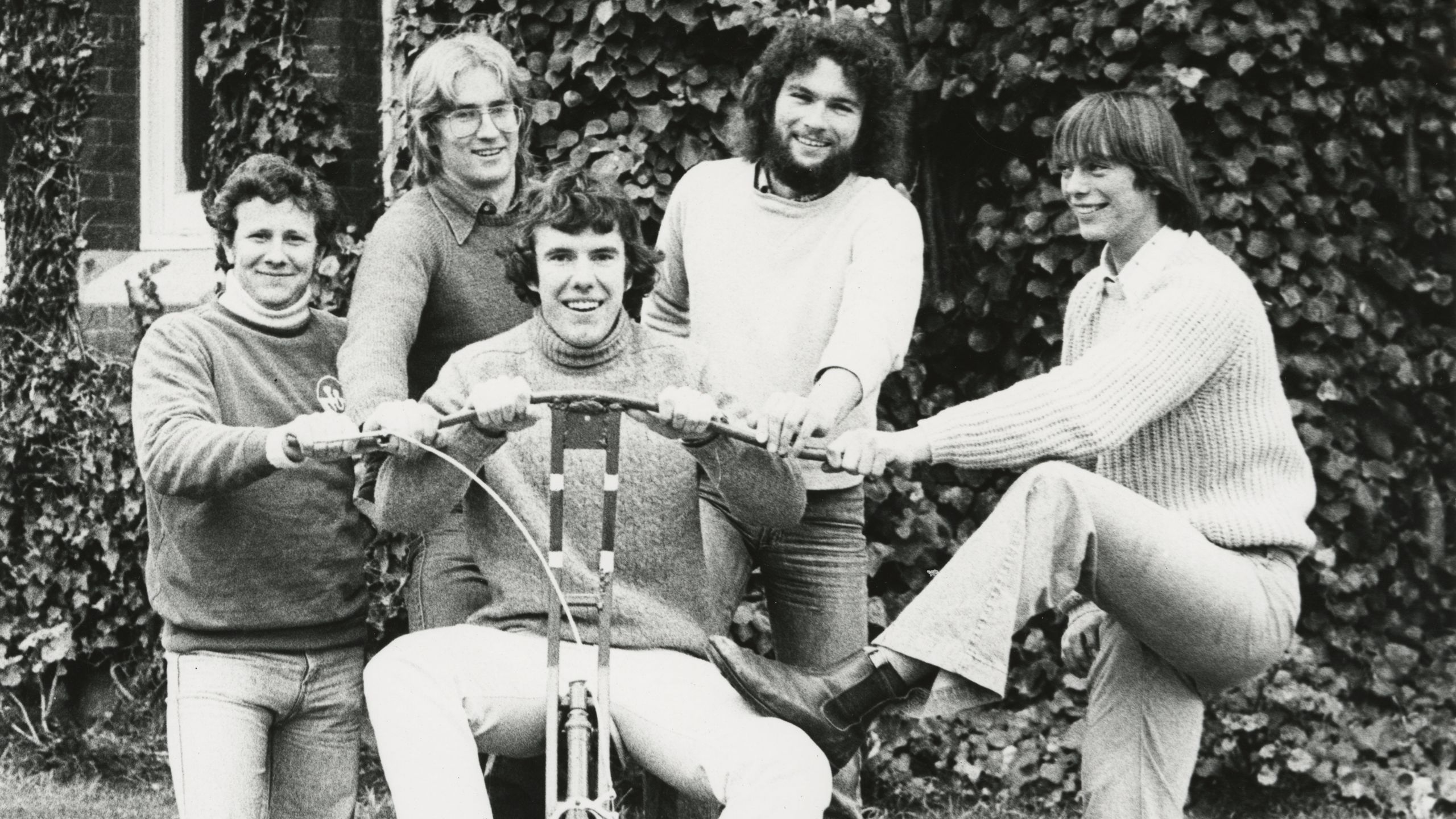
Only a few weeks ago was the first baptism I have ever done in beer. The Trinity trike, resplendent in green and red, may not have carried the name of Arthur Hills to victory, but it did finish the course.
It is often said at Trinity that if it's repeated more than twice, it counts as a tradition.
How far the University Trike Race extended back in time, and indeed how far forward beyond the 1970s, remains contested space. If the college had stumped up an entrant it certainly didn't make it to the pages of the Fleur de Lys prior to 1977. Nor did it extend beyond 1979.
But like a fleeting comet, it shone brightly in college life for those few moments it was with us.
The trike races had emerged from the University's engineering department in the late 1960s, almost a decade before Trinity got involved. It fell in to a hiatus in the early 1970s but was revived in 1976, at which point engineering student Peter Sloane (TC 1973) invited his kid brother Geoff and Harry Asche, both freshers that year, to join him on the chemical engineers' team.
It was an awakening.
'We had such fun in 1976, that we went to the TCAC with a proposal for a Trinity College entry in 1977', Harry recalls. 'The first thing we had to do was build our own trike.'
A race committee was formed. Planning commenced, the whole affair cloaked in that necessary shroud of discretion. Couldn't let our friends at Ormond get wind of the scheme.
Its early development took place in the secrecy of a deserted farmhouse north of Melbourne ...
Well, perhaps not so deserted. It was Fred Grimwade's (TC 1976) family-owned Glenaroura Homestead near Broadford, which proved a suitable location for the trike's construction.
Richard 'Clabbo' Clabburn, a boarding school colleague from Fred's Melbourne Grammar School days, was somewhat handy with a welder. Somewhat.
Over the course of a few weekends, with a certain amount of lubrication provided by our friends at Fosters, the tricycle's frame began to take shape. Some wheels from an old wheelchair purportedly last seeing action in the 1920s were acquired, a lick of paint, and there stood a machine ready to take on the roads.
After dinner in the Hall one night, Warden Revd Dr Evan Burge christened the three-wheeler with a sprinkling of lager and those immortal words:
"It shall go up hills, it shall go down hills, it shall be named the Arthur Hills"
With a course that began in the beachside township of Portsea, the intrepid cyclists raced their way back around the arch of the bay to Parkville and the University campus, a journey of some 100 kilometres. This distance was covered by a race 'team' that would swap riders every 200 metres or so for the entire trip, that for most teams would be no fewer than four hours to make it back to campus.
The trick lay in the changeovers. The rider would have to ease themselves off the seat and stand on the back of the trike frame while the incoming, replacement rider - running alongside - lept on to the trike and performed the reverse manoeuvre on the opposing side.
'On the level you swapped every 50-100m', Geoff Sloane (TC 1976) recounts, 'so the changeovers were critical. Cars would then pick up the rider after their ride and drop them off ahead of the trike.'
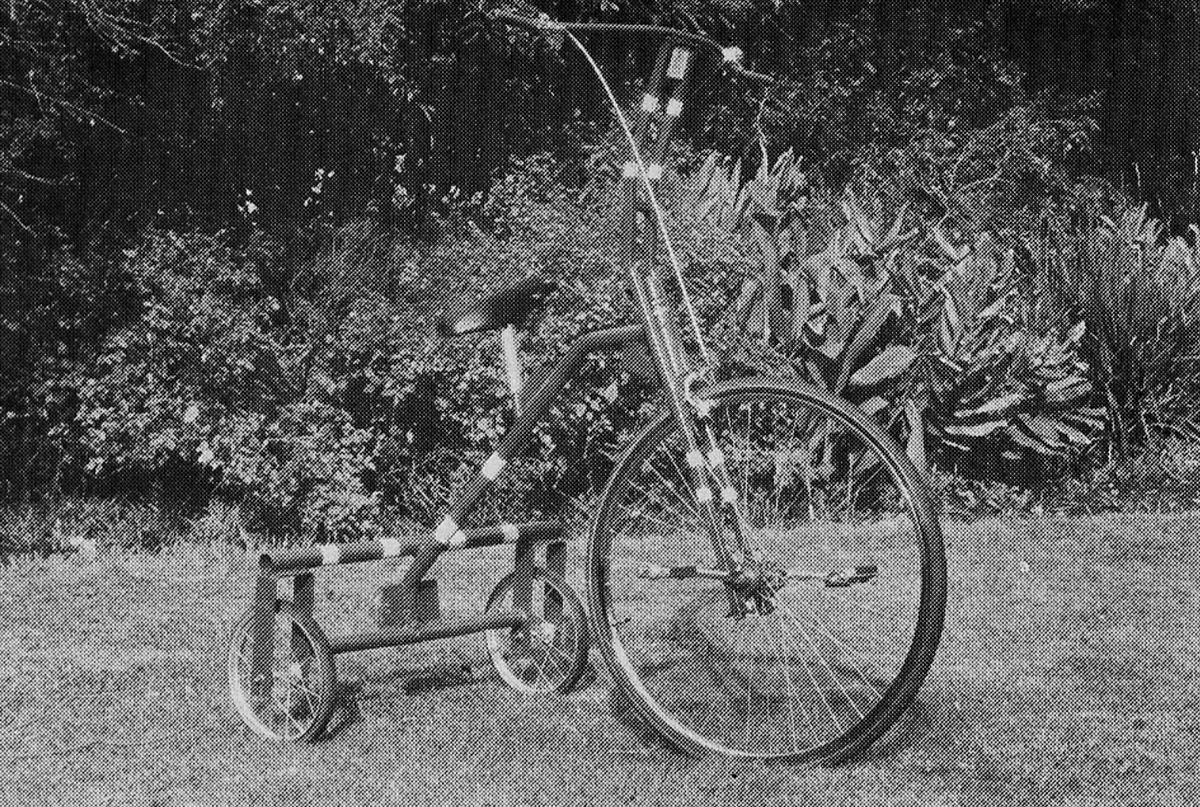
The 'Arthur Hills' was Trinity's inaugural entry to the Trike Race, in 1977.
The 'Arthur Hills' was Trinity's inaugural entry to the Trike Race, in 1977.
That is, if the riders - or their trikes - even made the distance.
Such was almost the case that first year. The vehicle had been created with such haste that there'd been little opportunity for the race team to get sufficient road-time on the wheels.
Last minute training was scheduled at the family property of Rick Potter (TC 1975) at Dromana, followed by the obligatory pre-race gathering at the Portsea Pub before retiring back to Red Hill, to the family property of Mandy Davey (TC 1977).
As the sun crested Arthur's Seat the following morning and bathed the peninsula in its warm glow, the team readied themselves for the 7.30am start. All was going well for the first 10 miles until Clabbo's welding proved not quite up to the task. A pitstop was required.
'Clabbo's trike did a fair job although the handle bars fell off mid-way through the race and had to be reattached with some rope.'
The necessary repairs made with some hasty welding at a local garage, the team got back on the road, only to suffer another mishap - a 'bad crash caused by severe flour bombing'.
Geoff recalls:
We had lost a lot of time, many trikes having passed us, but we were not to be beaten. The team 'dug em in' and the trike, somewhat handicapped, began to fly, especially down the Balcombe Army Camp hill in the hands of Nick Bailey (TC 1974) and Oliver's Hill at Frankston, piloted by Tim 'Evil Knieval' Maclean (TC 1975).
So close to home, a pedal fell off in Johnston Street in Collingwood, as the 'Arthur Hills' made its way along the final stretch towards campus. A little past 1pm, the trike rolled - actually, was pushed - into the University.
That first year, Trinity finished 7th out of 14 competitors. A staunch effort.
Attention turned to 1978.
'Arthur Hills' was to be rejuvenated. But more than simply a rejuvenated trike, a second, back-up entry with a number of technical improvements made to the design - among them a free wheel for 'faster and easier down-hill riding' - was also being constructed in parallel.
Appropriately, like the original trike, it took its name from the college's gardener, 'Frank Henagan'.
Security was tightly maintained during the many hours of workmanship, much of it planned in Jeopardy.
... the location of both trikes was constantly changed in case of sabotage attempts made by unscrupulous rivals.'
Arriving at the Portsea Pub in readiness for the pre-evening, 'dignified' (ahem!) event, it was a surprise to many that Trinity had stumped up the largest contingent of supporters of any of the colleges. When the group 'retired' back to the Davey's farm, still more collegians of the green and red arrived, bringing the number close to 60 - more than a quarter of the college's residential body.
A strong coffee softened the effects of the previous night, and second-year Tim 'Biggles' Brookes (TC 1977) climbed on to the seat of 'Frank' to begin the long journey northwards.
There were two notorious places along the route where even experienced riders grimaced. The first was at Olivers Hill coming into Frankston, where Tim Maclean had so skillfully navigated the turns in 1977. The other was the Punt Road hill.
With a slope better resembling a rollercoaster, the trikes would pick up incredible speed heading north, the Yarra River at the bottom of the hill. But so was a set of traffic lights. If they turned against the riders while they were hurtling down the hill ... well, ...
'We had to position some team at the lights at the bottom of the Punt road hill', Geoff explains, 'to stop the traffic in case the lights were red!'
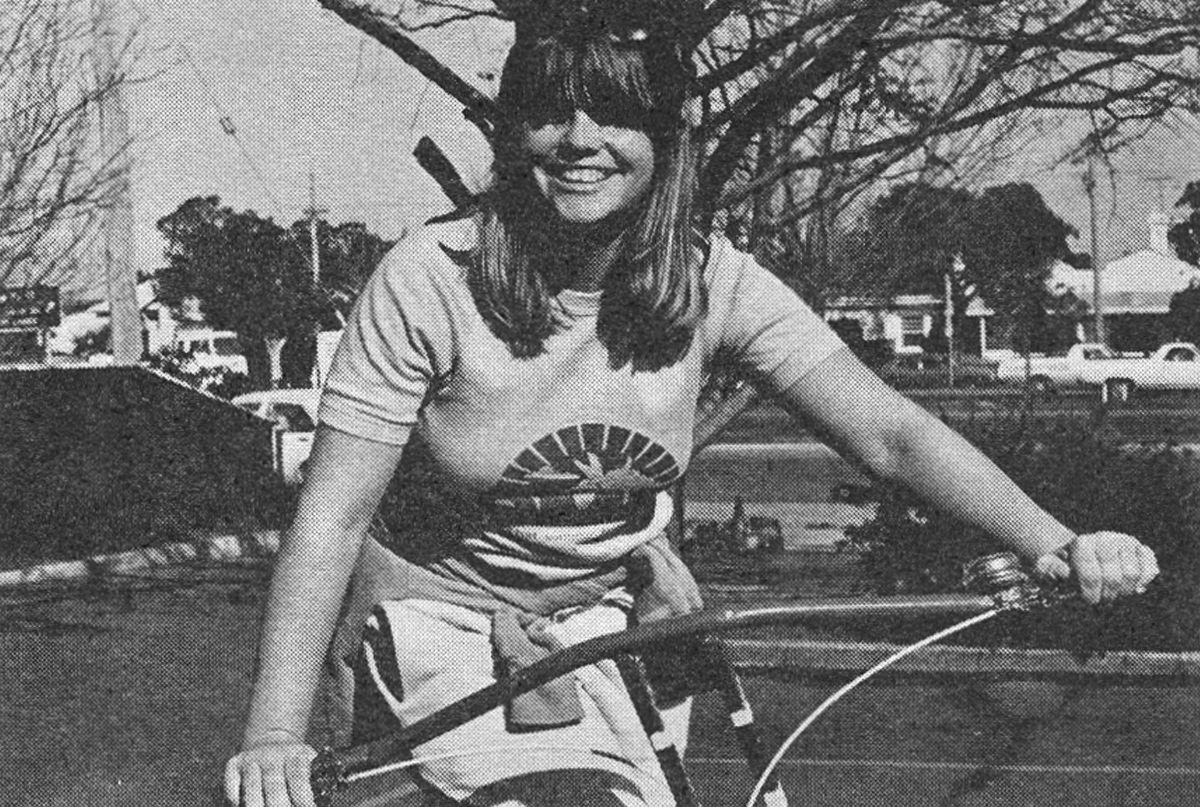
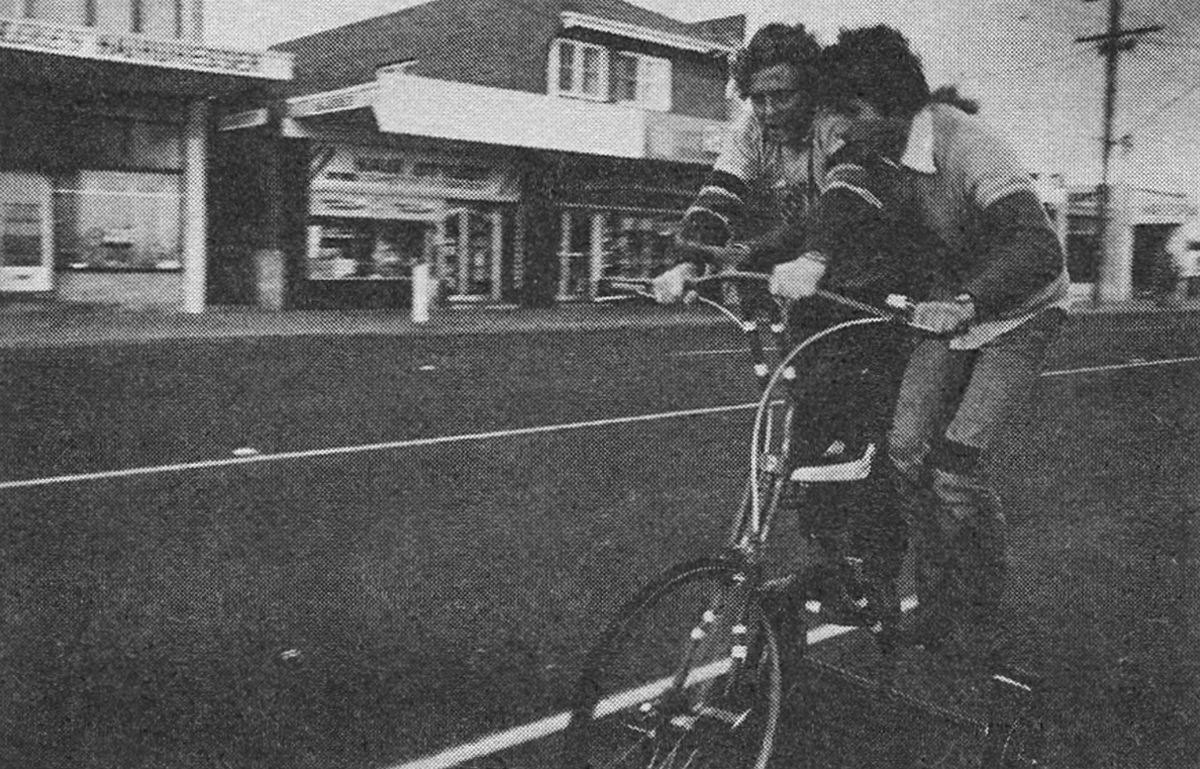
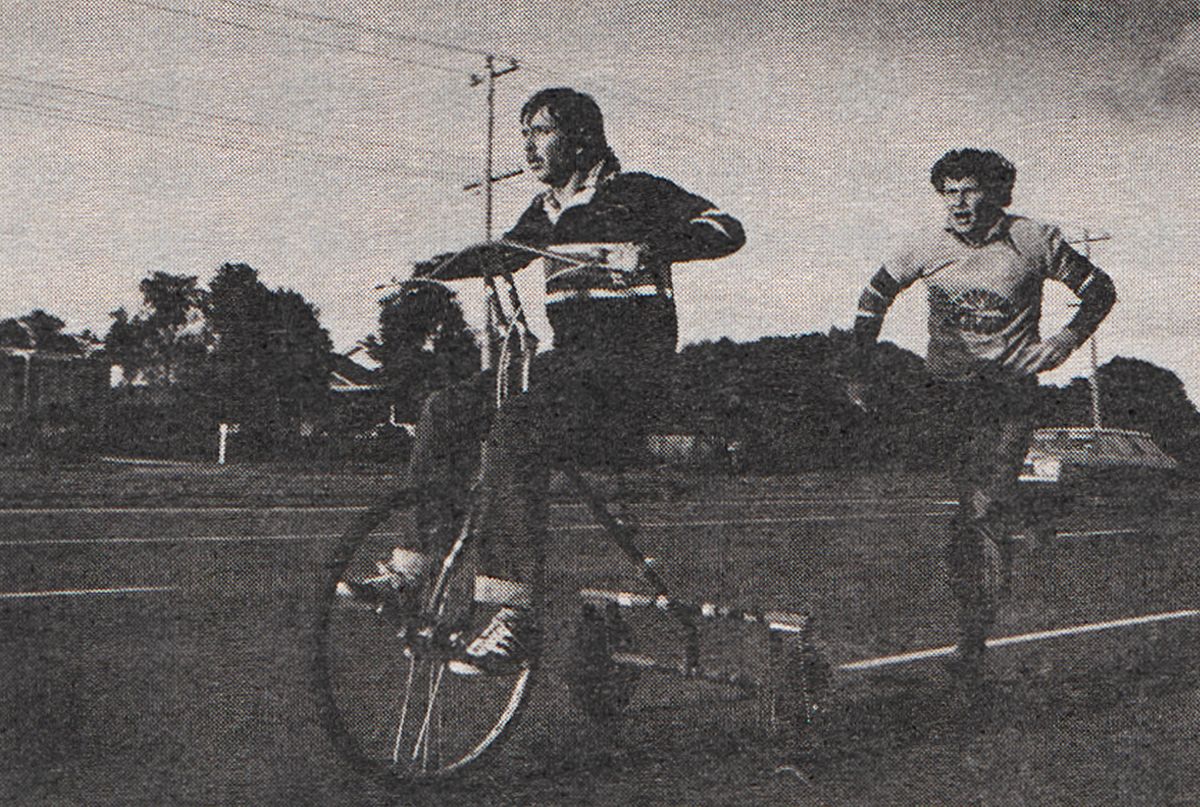

Mandy Davey (TC 1977) demonstrates her cycling technique astride Trinity's 1978 trike entry.
Mandy Davey (TC 1977) demonstrates her cycling technique astride Trinity's 1978 trike entry.

A 'mid-race' shot, showing the challenges involved in the rider change-over.
A 'mid-race' shot, showing the challenges involved in the rider change-over.

A significant factor (confirmed by race officials) was that Trinity undoubtedly had the best logistical support of any team.
A significant factor (confirmed by race officials) was that Trinity undoubtedly had the best logistical support of any team.
In all, 25 riders in addition to back-up crew would see the two trikes arrive back at college.
'For some time we suffered some harassment from an exceedingly officious traffic cop who clung to our tails with leech-like enthusiasm for over ten miles.'
1979 was the final year of Trinity's involvement in the race. It had been a good ride, not without the usual mishaps that had made past rides memorable, but now the University campus was almost in sight.
A sprint commenced when suddenly two other trikes appeared from 'behind a tram, upon which they had undoubtedly been riding'.
Standing in the saddles, a frantic dash ensued as competitors charged towards the finish line. So close was the call, and without a race 'official' able to be found for some time, it was unclear just what the final call had been.
Then it came - Trinity, a very respectable second!
By 1980, the 'original crew' had moved out of residence, and with their departure - and the very evident perils of the ride starting to gain various administrations' attention - the trike race ceased to be.
But for a few years - just a few years - it was a college 'tradition'. And left us with many a good tale and memory shared amongst those who were involved.
Trinity riders under police escort making their way to Parkville from Portsea, during the 1978 Trike Race.

Dr Ben Thomas, Rusden Curator, Cultural Collections
curator@trinity.unimelb.edu.au





